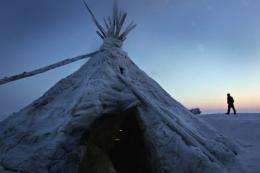A local Nenets reindeer herder passes by his tent at a camp in Tundra, Russia in 2008. An oil spill in the Russian Arctic affected an area of up to 8,000 square meters after workers tried to open an old well, causing oil to gush uncontrollably for 37 hours, officials said Monday.
An oil spill in the Russian Arctic affected an area of up to 8,000 square meters after workers tried to open an old well, causing oil to gush uncontrollably for 37 hours, officials said Monday.
The spill at the Trebs field started on Friday and continued through the weekend, spurting out up to 500 tonnes of oil per day, the Nenets autonomous district administration said on its website Monday.
The government of the Nenets autonomous district estimated the area of the oil spill at more than 5,000 square metres (53,000 square feet), while the Russian natural resources ministry said 8,000 square metres (86,000 square feet) of land had been affected.
The oil well was in the area operated by a joint venture between Russian companies Lukoil and Bashneft, which received the license to work on the northern Trebs field last year.
The accident was most likely caused by breakage of an old well's corroded plug when workers attempted to operate it, said Viktor Ivkin, head of the Nenetsky autonomous district emergency ministry branch.
"That well had been sealed a long time ago," he told AFP.
Workers managed to stop the fountain of oil Sunday morning, and work was under way to construct a storage facility for the spilled oil, he said.
The Nenets autonomous district is a part of the far-northern Arkhangelsk region that lies on the Barents Sea and is populated by the indigenous Nenets people.
Its economy relies almost entirely on oil being produced by Russian and international oil companies.
"Oil workers lost control of the well," WWF Russia said in a statement. "Fortunately it is far enough away from the coast to protect the Arctic's sea wildlife from pollution."
But the NGO wondered how long it would take to stop a similar spill if the accident occurred on an off-shore platform in the Arctic. "The accident proves that pollution risks are very real with the oil industry's expansion in the Arctic," WWF's energy expert Alexei Knizhnikov said.
Russia's state company Rosneft struck a strategic alliance with ExxonMobil last year to explore the Arctic's Kara Sea for oil, investing $2.2 billion into offshore projects there.
Last week the companies detailed the deal, calling it the era of "offshore projects of unprecedented scale".
(c) 2012 AFP























